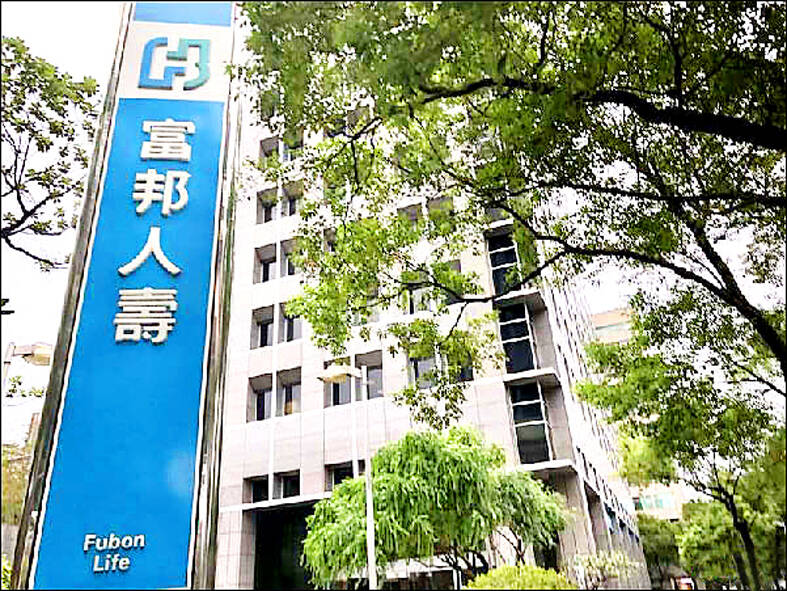Fubon Life Insurance Co (富邦人壽) plans to issue NT$50 billion (US$1.54 billion) of subordinated corporate bonds — on top of the NT$25 billion it issued in the first half of the year — to bolster its financial strength, parent company Fubon Financial Holding Co (富邦金控) said in a regulatory filing yesterday.
The subordinated bonds, with a maturity date of 10 years or longer, would be issued in one or several tranches within one year through public offerings, the filing said.
Fubon Life and its local peers have been gearing up to issue new debt to strengthen their financial structure and increase their risk-based capital ratio, as Taiwan’s insurance sector is to adopt the International Financial Reporting Standard 17 (IFRS 17) and the new Insurance Capital Standard framework in 2026.

Photo: Kelson Wang, Taipei Times
A subordinated bond is a type of debt that ranks lower in priority, with respect to claims on assets in case of bankruptcy or liquidation.
Long-term subordinated bonds have increasingly become a favored channel for life insurers to raise funds, as they are popular among investors in the Taiwanese fixed-income market, given their relatively higher yields.
Fubon Life’s board has authorized the company’s chairman or any designated person to decide the coupon rate of the new offering depending on market conditions, the filing said.
Earlier this year, Fubon Life sold NT$14.88 billion of 10-year subordinated bonds with a coupon rate of 3.7 percent, and NT$10.12 billion of 15-year bonds with a coupon rate of 3.85 percent, Taipei Exchange data showed.
In April, Cathay Life Insurance Co (國泰人壽), the nation’s largest insurer, also announced that it would issue up to NT$50 billion in subordinated bonds, offering 3.7 percent for 10-year debt and 3.85 percent for 15-year debt, exchange data showed.
So far this year, six life insurers — which also include Nan Shan Life Insurance Co (南山人壽), KGI Life Insurance Co (凱基人壽), Shin Kong Life Insurance Co (新光人壽) and Mercuries Life Insurance Co (三商美邦人壽) — have announced plans to issue subordinated bonds to raise funds.
The sector sold a record-high NT$111 billion in subordinated debt last year, data compiled by the Financial Supervisory Commission showed.

Sweeping policy changes under US Secretary of Health and Human Services Robert F. Kennedy Jr are having a chilling effect on vaccine makers as anti-vaccine rhetoric has turned into concrete changes in inoculation schedules and recommendations, investors and executives said. The administration of US President Donald Trump has in the past year upended vaccine recommendations, with the country last month ending its longstanding guidance that all children receive inoculations against flu, hepatitis A and other diseases. The unprecedented changes have led to diminished vaccine usage, hurt the investment case for some biotechs, and created a drag that would likely dent revenues and

Global semiconductor stocks advanced yesterday, as comments by Nvidia Corp chief executive officer Jensen Huang (黃仁勳) at Davos, Switzerland, helped reinforce investor enthusiasm for artificial intelligence (AI). Samsung Electronics Co gained as much as 5 percent to an all-time high, helping drive South Korea’s benchmark KOSPI above 5,000 for the first time. That came after the Philadelphia Semiconductor Index rose more than 3 percent to a fresh record on Wednesday, with a boost from Nvidia. The gains came amid broad risk-on trade after US President Donald Trump withdrew his threat of tariffs on some European nations over backing for Greenland. Huang further

Macronix International Co (旺宏), the world’s biggest NOR flash memory supplier, yesterday said it would spend NT$22 billion (US$699.1 million) on capacity expansion this year to increase its production of mid-to-low-density memory chips as the world’s major memorychip suppliers are phasing out the market. The company said its planned capital expenditures are about 11 times higher than the NT$1.8 billion it spent on new facilities and equipment last year. A majority of this year’s outlay would be allocated to step up capacity of multi-level cell (MLC) NAND flash memory chips, which are used in embedded multimedia cards (eMMC), a managed

CULPRITS: Factors that affected the slip included falling global crude oil prices, wait-and-see consumer attitudes due to US tariffs and a different Lunar New Year holiday schedule Taiwan’s retail sales ended a nine-year growth streak last year, slipping 0.2 percent from a year earlier as uncertainty over US tariff policies affected demand for durable goods, data released on Friday by the Ministry of Economic Affairs showed. Last year’s retail sales totaled NT$4.84 trillion (US$153.27 billion), down about NT$9.5 billion, or 0.2 percent, from 2024. Despite the decline, the figure was still the second-highest annual sales total on record. Ministry statistics department deputy head Chen Yu-fang (陳玉芳) said sales of cars, motorcycles and related products, which accounted for 17.4 percent of total retail rales last year, fell NT$68.1 billion, or